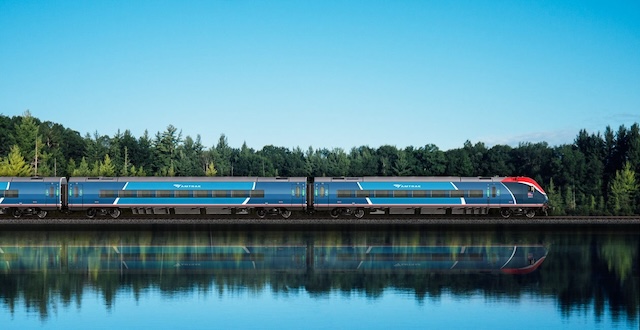Every line item in the federal budget has at least one special interest group advocating for its growth and ready to cry bloody murder if anyone proposes to reduce it. So it is no surprise that Trains magazine is shocked that Elon Musk would propose to privatize Amtrak.
Amtrak received a $7.3 billion federal grant to buy 83 new trains from Siemens that will be used in the Northeast Corridor and on state-subsidized day trains.
“Amtrak’s business performance is strong,” Trains quotes an Amtrak spokesperson. “Ridership and revenue are at all-time highs.” But a “strong” performance didn’t prevent Amtrak from losing well over $2 billion on operating costs alone in 2024, and Amtrak’s all-time highs are still pretty low: in 2024, Amtrak carried the average American just 19.6 miles. Americans ride bicycles far more than they ride Amtrak, they fly more than 100 times as many miles, and they travel more than 700 times as many miles by car as they ride Amtrak.
The president doesn’t have the authority to privatize Amtrak without Congressional approval. In fact, the president has very little authority over Amtrak. But the president does have authority over transit funding, so expect a hue and cry whenever Musk gets around to looking at transit.
Most federal funding of departments such as Education, Housing, and Transportation are pass-through funds, monies given to state and local governments. There are two types of pass-through funds: formula funds and competitive grants. The departments administer formula funds, mainly to ensure they are spent the way they are supposed to be spent, but they award competitive grants using criteria written by Congress.
This means Trump and Musk have no authority to cut formula funds without Congressional approval. But they can decide to not award competitive grants if none of the grant proposals meet Congressional criteria. Since other administrations have generally ignored those criteria in their eagerness to pass out money, it is likely that large percentages of competitive grants can simply be withheld for failure of any grant proposals to meet the criteria.
The largest transit grant fund is capital investments, and Congress specified that, to be eligible for these grants, transit agencies must show they are cost-effective in terms of cost per rider. The Obama administration emasculated that law by writing a rule that basically said everything was cost effective. As a result, transit agencies haven’t been seriously evaluating the cost effectiveness of their proposed projects, which will allow the administration to reject all projects.
As a general rule, no rail project is cost effective when compared with buses and no bus rapid transit project with dedicated bus lanes is cost effective compared with buses on shared lanes. Thus, even if transit agencies did cost-effectiveness studies for their projects, the Secretary of Transportation could reject them all. The one kind of project that might be cost effective would be the construction of new shared lanes, such as HOV or HOT lanes, since those lanes would carry a lot of travelers in addition to the transit riders. But the transit capital grants program should only pay the fraction of such shared-lane projects attributable to transit, meaning states would have to find highway funds for the rest.
I suspect that many other competitive grant funds have not been following the criteria set out by Congress when it created those funds. I hope that Musk’s Department of Government Efficiency understands the difference between formula funds and competitive grants and uses that difference to cut spending on competitive grants in many federal agencies.









Privatize Amtrak, won’t work because infrastructure demands are impossible to fulfill. Unless Musk Boring company can do conventional track rapidly or some other competitive contractor
Privatizing Amtrak wouldn’t work because there will never be enough passengers willing to share the full expense of running Amtrak trains.
Failed socialist trains lose money while the capitalist interstate highway system posts strong profits year after year!
Let’s structure highway system to expected revenue streams like Antiplanner been talking about for…decades.
But keep socializing my trains.
Wish one hand shit in the other. Jane’s case shits in both thinks he making chocolate
LMAO I have NEVER heard the AP call for a nationwide toll of the US Interstate system. And he never will, either.
Fortunately, that’s handled predominatnly on the state level.
Real solution as antiplanner stated is allow states Opt out federal earmarks. Allow states to fix their own gas taxes and tolls, so they get to keep the funding, by doing that, Federals cant play with it like they do every year. Is the a role for federal funding in transportation infrastructure? maybe… But as weve seen they have a poor janitor record. Amtrak has been federally funded since it’s inception, with auspices that theyd sell it off as a private company.
Europes rail system operates different mentality. Rail companies operate trains at a “Profit” but the government pays for infrastructure at significant expense, the infrastructure companies are their own rail entity. and they have substantial debts OFF THE BOOKS.
https://repository.gatech.edu/server/api/core/bitstreams/b755c479-1835-4e89-9cbe-2c94bb5fd519/content
Janehavisham,
You haven’t listened very closely then. I’ve long advocated charging per-mile user fees, not just for interstates but for all roads. Oregon has had a system for this for several years and I’ve participated in it, paying per mile charges instead of gasoline taxes for my car.
“Fortunately, that’s handled predominatnly on the state level.”
Wow, what a relief. And here I was worrying about the Highway Trust Fund being empty in 2028.
LMAO I have NEVER heard the AP call for a nationwide toll of the US Interstate system. And he never will, either.
You must be a very selective reader. He has written about this numerous times. Here is a link with a few posts to get you started. You’re welcome.